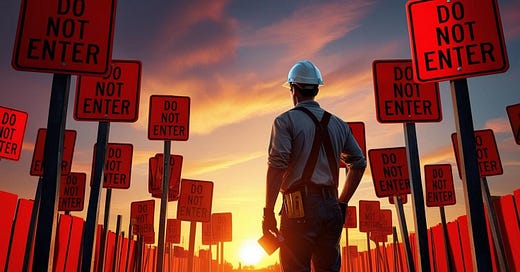Barriers to Entry
About 10 years ago, my wife achieved a long-held ambition. Together with an old school friend, she opened a café in a nearby shopping centre. Her idea was simple: to create a place that wasn’t McDonald's or Starbucks, somewhere people of all generations could meet over pots of tea and freshly made sandwiches.
But escalating rent, rising food costs, staffing issues, and — worst of all — the burden of food hygiene regulations quickly turned my wife’s dream into a nightmare.
I realise that a café may seem worlds away from demolition and construction. And yet, we’re seeing a similar scenario play out in our industry.
Not too long ago, a young person — practically fresh out of school — could begin their entrepreneurial journey in demolition or construction. They’d borrow money to buy a second-hand machine. It might have been old, it might have smoked a bit, and it might not have been the most reliable. But through hard work and determination, they could start landing jobs.
At first, they’d subcontract for a larger firm, learning (and earning) as they went. Soon, they’d win their own contracts, building a reputation. One machine became two, and eventually, a one-man band grew into an actual demolition company.
But here’s where things have changed. The barriers to entry for someone wanting to start in demolition today are like those my wife faced with her café a decade ago.
First, that second-hand machine — the one that used to belch smoke on startup? That doesn’t fly anymore. In today’s world of Ultra-Low Emission Zones, older, smokier machines are no longer an option. If someone wants to start a demolition company right out of school, they’re immediately saddled with debt to buy a brand-new, ultra-clean machine.
Speaking of all things financial, many clients now insist that their demolition contractor of choice will have enough money in the bank to see the project through to completion; and that they have insurance that is equivalent to the national debt.
If they overcome those obstacles, the modern world throws another challenge at them: regulations and legislation. Fifteen or twenty years ago, a growing demolition company’s first hire was usually a second operator to help take on more or larger projects. Today, the mountain of laws covering employment, the environment, and more makes the most sensible first hire someone to keep you out of court.
Last week, we discussed the vast regulatory landscape facing demolition and construction companies today. Compliance has become a daunting, full-time job. Instead of focusing on work, growth, and creating jobs, a fledgling company’s attention has shifted to avoiding breaches in legislation.
And there’s more. With this legal labyrinth comes the need for a legal expert on standby — an expensive necessity. They’ve crafted a language of their own, so only they truly understand the required documentation.
Assuming you can still afford to hire an operator, you’ll encounter another hurdle: industry competence training. The “learn and earn” model isn’t acceptable anymore. Now, new hires need classroom sessions and certification. You pay hefty fees for their competence card, and only then can you teach them the practical aspects of the job.
A new company will likely need a website and online presence. They outsource it at considerable cost, only to realise the website is so complex they can’t manage it themselves, forcing them to keep paying the designer.
There’s likely a trade association lurking in the wings, too. They’ll promise membership will land you on the hottest tender lists, distinguish your company, and help you shape the industry for the better. But this will cost you a few thousand per year, along with a commitment to attend pointless, introspective meetings. Meanwhile, those tender lists are just as inaccessible as they were when you were a one-man band.
Taken individually, none of these obstacles would necessarily deter someone from pursuing their demolition dreams. But together, they suggest that the industry isn’t eager to welcome newcomers. Instead, it has built — or allowed to be built — endless barriers to entry.
When we discuss our failure to attract young people into the sector, we usually focus on individual workers fresh from school or college joining the workforce. But, whether intentional or not, we’ve simultaneously created a system that makes true entrepreneurship nearly impossible.
We are familiar with the No Entry signs around demolition sites. But it now appears there are even more No Entry signs around the demolition business itself.





